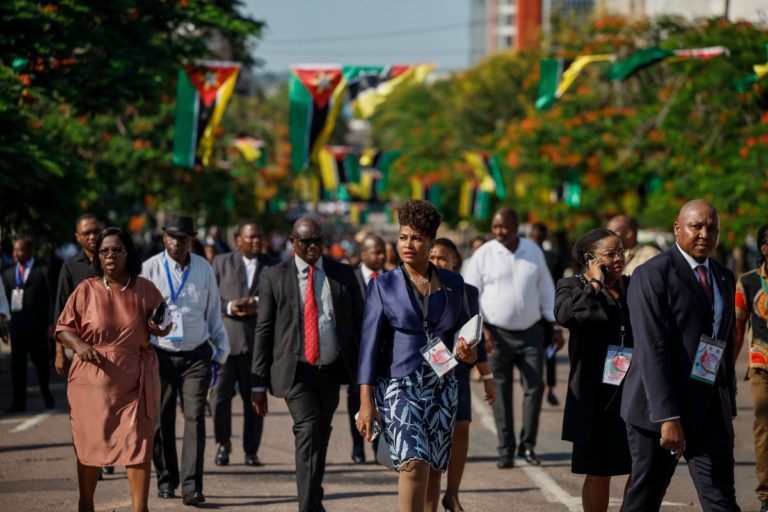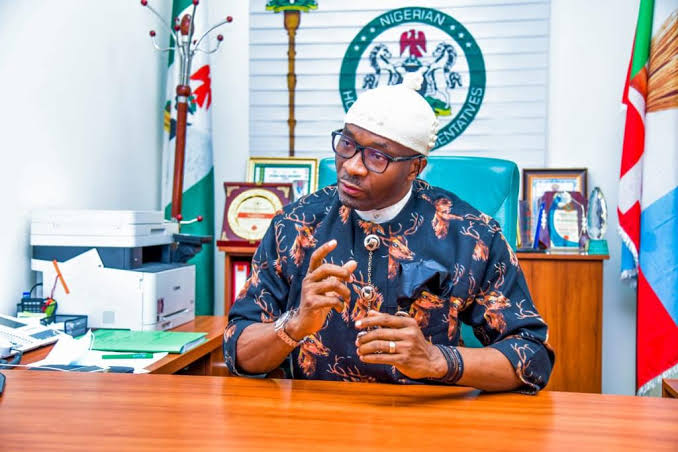News
Mozambique inaugurates new president , Wednesday

Mozambique President-elect Daniel Chapo will be sworn into office Wednesday after weeks of deadly political unrest but the main opposition leader has vowed to “paralyse” the country with fresh protests against the fiercely disputed election result.
Venancio Mondlane had already called for a national strike in the days leading up to the inauguration and threatened on Tuesday to curtail the new government with daily demonstrations.
Mondlane, 50, who is popular with the youth, maintains the October 9 polls were rigged in favour of Chapo’s Frelimo party, which has governed the gas-rich African country since independence from Portugal in 1975.
“This regime does not want peace,” Mondlane said in an address on Facebook Tuesday, adding his communications team was met with bullets on the streets this week.
“We’ll protest every single day. If it means paralysing the country for the entire term, we will paralyse it for the entire term.”
Chapo, 48, called for stability on Monday, telling journalists at the national assembly “we can continue to work and together, united… to develop our country”.
International observers have said the election was marred by irregularities, while the EU mission condemned what it called the “unjustified alteration of election results”.
The swearing in ceremony was expected to be snubbed by foreign heads of state, a move “which sends a strong message”, Maputo-based political and security risk analyst Johann Smith told AFP.
Former colonial ruler Portugal is sending Foreign Minister Paulo Rangel.
“Even from a regional point of view there is a hesitancy to acknowledge or recognise that Chapo won the election,” Smith said, pointing out that neighbouring South Africa’s president would also not be attending.
The extent of the unrest from now on “depends on how Chapo will tackle the crisis”, analyst Borges Nhamirre told AFP.
The inauguration of parliamentary lawmakers Monday was held amid relative calm in the capital, Maputo.
The streets were deserted, with most shops closed either in protest against the ceremony or out of fear of violence, while military police surrounded the parliament building and police blocked main roads.
Still, at least six people were killed in the Inhambane and Zambezia regions north of the capital, according to local civil society group Plataforma Decide.
– Possible concessions –
Unrest since the election has claimed 300 lives, according to the group’s tally, with security forces accused of using excessive force against demonstrators. Police officers have also died, according to the authorities.
Chapo, who is expected to announce his new government this week, could make concessions by appointing opposition members to ministerial posts to quell the unrest, said Eric Morier-Genoud, an African history professor at Queen’s University Belfast.
There have also been calls for dialogue but Mondlane has been excluded from talks that Chapo and outgoing President Filipe Nyusi have opened with the leaders of the main political parties.
Chapo has repeatedly said however that he would include Mondlane in talks.
Mondlane, who returned to Mozambique last week after going into hiding abroad following the October 19 assassination of his lawyer, has said he was ready for talks.
“I’m here in the flesh to say that if you want to negotiate… I’m here,” he said.
According to official results, Chapo won 65 percent of the presidential vote, compared to 24 percent for Mondlane.
But the opposition leader claims that he won 53 percent and that Mozambique’s election institutions manipulated the results.
Frelimo parliamentarians also dominate the 250-seat national assembly with 171 seats compared to the Podemos party’s 43.
News
A Chat with Janet Odio Okolo: A Mother’s Journey Raising a Child with Down Syndrome

News
Hon. Nnamchi Begins Street Lights Deployment In Isi Uzo(Photos)

Honourable Paul Sunday Nnamchi, representing Enugu East/Isi Uzo Federal Constituency in the 10th House of Representatives, has fulfilled his promise to illuminate communities in Isi Uzo Local Government Area.
The lawmaker has just begun the deployment of high-density solar-powered street lights in Ikem Nkwo, marking the beginning of a massive rollout of the street lamps across the communities in Isi Uzo.
This initiative, which started in Enugu East Local Government Area in 2024, aims to support the fight against insecurity in the state which according to him was to add to what Chief Security Officer of Enugu State Barrister Peter Mba had done to secure the state to attracts foreign investments.
The lawmaker expressed concern over banditry attacks, particularly by herdsmen, in some communities within Isi Uzo and Enugu East Local Government Areas in the recent pasts.
He believes that illuminating these areas with high-density street lights would help address the insecurity adding that he was prioritizing border and farming communities in Isi Uzo, where banditry has displaced residents and restricted farming activities.
Communities in Ikem, Eha-Amufu in Isi Uzo which borders Enugu and Benue State and Ugwogo-Nike in Enugu East have been vulnerable to these attacks due to their strategic locations.
News
May Day: Kalu Hails Workers, Applauds Their Role in Nation Building

By Gloria Ikibah
Deputy Speaker of the House of Representatives, Rep. Benjamin Kalu, has extended warm wishes to Nigerian workers as the country marks the 2025 edition of International Workers’ Day.
Kalu praised workers across various sectors for their commitment and resilience, describing them as the engine that keeps the nation moving. He acknowledged their sacrifices and unrelenting drive, especially during tough economic times.
In his message, he highlighted the efforts of the current administration under President Bola Tinubu to improve the welfare of public servants. He referenced the National Assembly’s prompt backing of the new minimum wage as a sign of the government’s seriousness about workers’ wellbeing.
The Deputy Speaker appealed for continued patience and understanding from Nigerians, noting that the ongoing economic reforms, while challenging, are designed to bring long-term relief and prosperity.
Kalu also called for unity, and said the country can only overcome its present difficulties if citizens and leaders work together in good faith.
He therefore urged workers to keep the faith and remain steadfast in their duties, assuring them that brighter days are on the horizon, and wished Nigerian workers a peaceful and fulfilling May Day celebration.
-

 Metro21 hours ago
Metro21 hours agoGunmen storm University of Benin teaching hospital, kill doctor
-

 Metro22 hours ago
Metro22 hours agoFCTA destroys 601 motorbikes over violations
-

 News13 hours ago
News13 hours agoAlleged money laundering: EFCC produces Aisha Achimugu in court
-

 News22 hours ago
News22 hours agoJust in: FG declares tomorrow public holiday
-

 News15 hours ago
News15 hours agoJUST IN: Major General Paul Ufuoma Omu Rtd, dies at 84
-

 News15 hours ago
News15 hours agoTinubu hails Dangote’s World Bank appointment
-

 News17 hours ago
News17 hours agoSAD! Professor’s son takes own life inside varsity staff quarters
-

 News21 hours ago
News21 hours agoFull list: FG approves N110bn to rehabilitate medical schools 18 institutions























